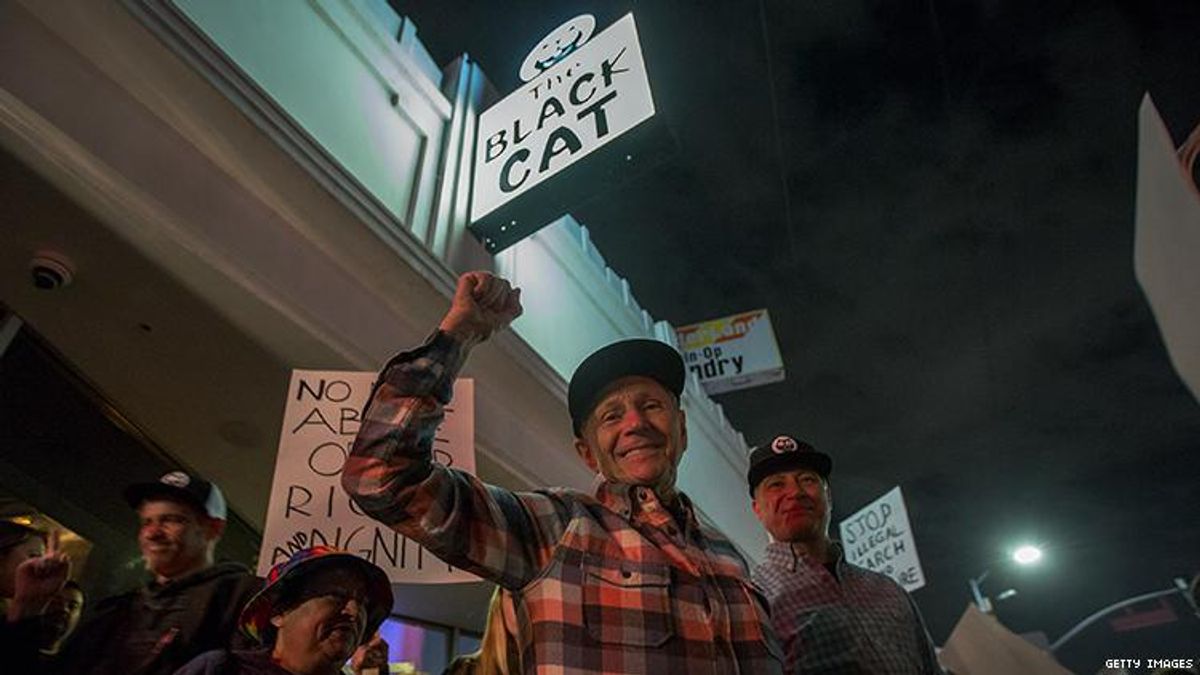World Pride and the 50th anniversary of Stonewall are still a few weeks away. But the spirit of the New York City riots, which are widely credited with the LGBTQ rights movement, reverberated thousands of miles away at last weekend's L.A. Pride.
In fact, one of the first sights that could be seen walking into the West Hollywood festival, produced by the nonprofit Christopher Street West, was a replica of the Stonewall Inn's glowing red sign above one of the bar areas. It was one of several historic LGBTQ watering holes that had been reimagined and re-created for the LGBTQ celebration. Another was the Black Cat -- a Silver Lake bar whose 1967 uprising, which led to the founding of The Advocate magazine, preceded Stonewall.
The Stonewall anniversary was mentioned by many of L.A. Pride's speakers and singers, who referenced it as both a sign of progress -- the police were there protecting the festival, not raiding it, after all -- as well as a reminder of the resilience and resistance of the modern-day LGBTQ community.
But beyond Stonewall -- and perhaps in response to of it -- L.A. Pride found many ways to give West Coast LGBTQ history a place of honor throughout its two weeks of festivities. The first pitch was thrown by lesbian tennis legend (and Long Beach, Calif.) native Billie Jean King at the L.A. Dodgers Pride night. The opening night of the festival began with a screening of 5B, a stirring documentary honoring the nurses who cared for the AIDS patients in San Francisco.
Moreover, the parade's grand marshals were local history-makers: Phill Wilson -- the pioneer who founded the Black AIDS Institute -- as well as the Los Angeles LGBT Center, a jewel of an institution that has served the health and wel-lbeing of the city's queer people for decades.
L.A. Mayor Eric Garcetti -- who, perched on a balcony at a garden party last week launching Pride, felt moved to sing a few lines from Evita --reminded queer Angelenos that while Stonewall is the most famous event of the LGBTQ movement, Los Angeles has its own deep history to be proud of.
"This is one of the great civil rights cities in the world," Garcetti crowed to the crowd, before referencing how the past can inspire the progress of the future. "Not until we all have full rights, not until we have a federal government that matches what we do here locally, will we rest, and even then we know there will be work to do internationally."
"Los Angeles doesn't follow, we lead," Garcetti told The Advocate just beforehand. "I think many people think civil rights history is written in other parts of the country -- the South for racial equity, New York for LGBTQ equality. Los Angeles can lay claim to being at the forefront of desegregated schools, of pushing forward [for LGBTQ rights] long before Stonewall happened, with the Black Cat, and Cooper's Donuts a decade before."
Of course, L.A. Pride was still very much a celebration -- and a growing one at that. Its events -- the baseball game, Pride night at Universal Studios, the parade, and the concert featuring acts like Meghan Trainor, Paula Abdul, Ashanti, and Years & Years -- attracted record-breaking numbers. And in its own history-making moment, the L.A. Pride parade was broadcast on television for the first time in its nearly 50-year history through the local ABC affiliate, KABC.
However, activism -- and the threats coming from the Trump administration, particularly toward transgender rights -- was not forgotten during the festivities. The parade began with a performance from the Trans Chorus of L.A. as well as a place of honor for transgender troops, who are fighting a ban from military service imposed by President Trump.
Meghan Trainor, who took to the stage Saturday night in a billowing tulle rainbow and a flashing display of "Pride" behind her, took a moment from her set to honor LGBTQ history, its current struggles, and the place of Pride in the world today.
"There are people in the world who don't want us to be here. And they don't want us to be celebrating ourselves as we are. But none of that matters right now. You know why? Because we are here," said Trainor to the cheers of the crowd in the West Hollywood Park.
"This year is the 50th anniversary of Stonewall and the fourth anniversary of marriage equality. How dare people tell us how to love and how to live our lives? It's not right and it will never be right. And eventually, we will win. So tonight, we celebrate those who came before us. We remember every single one of them."


















































































Fans thirsting over Chris Colfer's sexy new muscles for Coachella